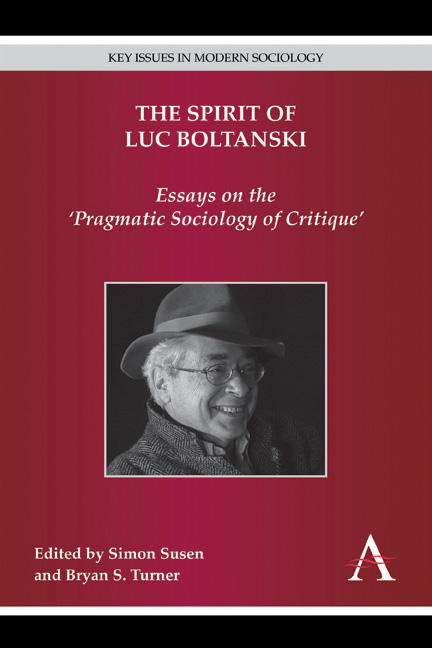Book contents
- Frontmatter
- CONTENTS
- List of Contributors
- Preface
- Part I Introductory Remarks
- Part II Luc Boltanski and (Post-) Classical Sociology
- Part III Luc Boltanski and Pragmatism
- Part IV Luc Boltanski and Critique
- 5 Is There Such a Thing as a ‘Pragmatic Sociology of Critique’? Reflections on Luc Boltanski's On Critique
- 6 Strengths and Limitations of Luc Boltanski's On Critique
- 7 A Renewal of Social Theory That Remains Necessary: The Sociology of Critical Capacity Twenty Years After
- 8 Enlarging Conceptions of Testing Moments and Critical Theory: Economies of Worth, On Critique, and Sociology of Engagements
- Part V Luc Boltanski and Critical Sociology
- Part VI Luc Boltanski and Political Sociology
- Part VII Luc Boltanski and Contemporary Issues
- Part VIII Luc Boltanski in Conversation
- Part IX Luc Boltanski and His Critics
- Index of Names
- Index of Subjects
6 - Strengths and Limitations of Luc Boltanski's On Critique
from Part IV - Luc Boltanski and Critique
Published online by Cambridge University Press: 05 December 2014
- Frontmatter
- CONTENTS
- List of Contributors
- Preface
- Part I Introductory Remarks
- Part II Luc Boltanski and (Post-) Classical Sociology
- Part III Luc Boltanski and Pragmatism
- Part IV Luc Boltanski and Critique
- 5 Is There Such a Thing as a ‘Pragmatic Sociology of Critique’? Reflections on Luc Boltanski's On Critique
- 6 Strengths and Limitations of Luc Boltanski's On Critique
- 7 A Renewal of Social Theory That Remains Necessary: The Sociology of Critical Capacity Twenty Years After
- 8 Enlarging Conceptions of Testing Moments and Critical Theory: Economies of Worth, On Critique, and Sociology of Engagements
- Part V Luc Boltanski and Critical Sociology
- Part VI Luc Boltanski and Political Sociology
- Part VII Luc Boltanski and Contemporary Issues
- Part VIII Luc Boltanski in Conversation
- Part IX Luc Boltanski and His Critics
- Index of Names
- Index of Subjects
Summary
Introduction
On Critique is an important book that deserves to be influential. In this chapter, I want to highlight the reasons for this, whilst also pointing to some limitations, and providing suggestions as to how these shortcomings might be addressed in ways that strengthen the overall project. In highlighting limitations as well as strengths I must be fair to Luc Boltanski, as he warns readers very early on that they should not expect a polished, carefully finished, product from On Critique. The chapters should just be read as if they were six talks, their actual genesis being even less than this – that is, three Adorno Lectures delivered at the invitation of Axel Honneth at the Institute for Social Research in Frankfurt in November 2008. They have since been ‘opened up’ by more up-to-date reflections on contemporary forms of domination and, inevitably, as a result of their journey from lecture to book form, during which Boltanski took the opportunity to reintroduce arguments into the text that had been relinquished for the lectures owing to strictures of time. Despite these amendments, however, the book is to be seen as sketchy and provisional. It is, he suggests, a series of remarks, presented in synthetic form, which accompanied his thinking in the three years before publication – and whose character and formulation, we can presume, will have continued to develop since. The articulation of these thoughts
has certainly not yet reached the desired level of integration and coherence, as if they had been set down on paper in preparation for composing a book.
(Boltanski, 2011 [2009]: ix–x)At best, he contends, On Critique is a sort of précis of critique.
Having acknowledged these caveats, however, I believe that the most productive, and ultimately the most respectful, way to approach the book is simply to take seriously the arguments it presents and, in addition, the terms in which it presents them.
- Type
- Chapter
- Information
- The Spirit of Luc BoltanskiEssays on the 'Pragmatic Sociology of Critique', pp. 211 - 234Publisher: Anthem PressPrint publication year: 2014

